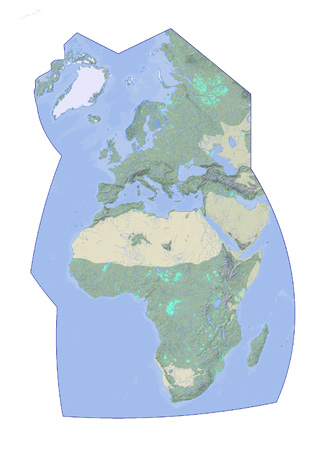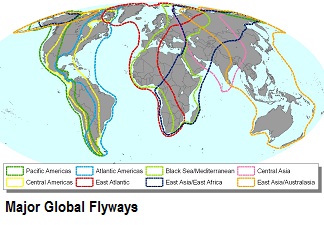AEWA
The Agreement on the Conservation of African-Eurasian Migratory Waterbirds (AEWA) is an intergovernmental treaty dedicated to the conservation of migratory waterbirds and their habitats across Africa, Europe, the Middle East, Central Asia, Greenland and the Canadian Archipelago.
Developed under the framework of the Convention on Migratory Species (CMS) and administered by the United Nations Environment Programme (UNEP), AEWA brings together countries and the wider international conservation community in an effort to establish coordinated conservation and management of migratory waterbirds throughout their entire migratory range.
Visit the general introduction leaflet on AEWA
Species Covered by AEWA
AEWA covers 255 species of birds ecologically dependent on wetlands for at least part of their annual cycle, including many species of divers, grebes, pelicans, cormorants, herons, storks, rails, ibises, spoonbills, flamingos, ducks, swans, geese, cranes, waders, gulls, terns, tropic birds, auks, frigate birds and even the south African penguin.
All AEWA species cross international boundaries during their migrations and require good quality habitat for breeding as well as a network of suitable sites to support their annual journeys. International cooperation across their entire migratory range, as provided by AEWA, is therefore essential for the conservation and management of migratory waterbird populations and the habitats on which they depend.
Agreement Area, Range States and Contracting Parties
The Agreement area stretches from the northern reaches of Canada and the Russian Federation to the southernmost tip of Africa, covering 119 Range States from Europe, parts of Asia and Canada, the Middle East and Africa. Currently 84 countries and the European Union (EU) have become a Contracting Party to AEWA (as of 1 July 2023). The Agreement provides for coordinated and concerted action to be taken by the Range States throughout the migration system of waterbirds to which it applies.
The Structure of AEWA
The Agreement has three main bodies: the Meeting of the Parties (MOP), which is the governing body of AEWA, the Standing Committee (StC) and Technical Committee (TC), respectively responsible for steering the operations between sessions of the MOP and for providing scientific advice. The UNEP/AEWA Secretariat supports the Parties and services the bodies of the Agreement.
The latest, eighth Session of the Meeting of the Parties took place from 26-30 September 2002 in Budapest, Hungary. For more information on MOP8 click here.
The AEWA Action Plan
The core activities carried out under AEWA are described in its Action Plan, which is legally binding for all countries that have joined the Agreement. The AEWA Action Plan specifies different measures to be undertaken by Contracting Parties to warrant the conservation of migratory waterbirds within their national boundaries. These include species and habitat protection and the management of human activities as well as legal and emergency measures. Research and monitoring, education, awareness-raising and capacity building are also essential tasks for the implementation of the Agreement. In addition, special protective measures are to be implemented for those waterbird populations of particular conservation concern, listed in Column A of the Action Plan.
Legal nature of AEWA
The Agreement on the Conservation of African-Eurasian Migratory Waterbirds (AEWA) is an independent Intergovernmental treaty, developed under the framework of the Convention on Migratory Species (CMS). The Agreement is subject of and governed by international law and its rules comply with the provisions of the Vienna Convention of the Law of Treaties. The Agreement is governed by its Meeting of Parties, which is the principal decision-making body established in accordance with Article VI of the Agreement. The Agreement Secretariat convenes ordinary sessions of the MOP at intervals of not more than three years, unless the Meeting of the Parties decides otherwise.
The UNEP/AEWA Secretariat is the Agreement’s coordinating body. Its functions are set out in Article VIII of the Agreement. The Secretariat is administered by the United Nations Environment Programme (UNEP). The establishment of the AEWA Secretariat under the administration of UNEP was adopted through Resolution 1.1. Administered by UNEP, the Secretariat is bound to follow the Rules and Regulations of the UN and UNEP in terms of all administrative issues for which it receives services from UNEP (i.e. budget management, staff, travel, procurement, property management etc.). Within this legal framework, the AEWA Secretariat has the legal capacity to enter into agreements or contracts with external partners, incur and pay debts and assume obligations in the context of its own field of work which is defined by the Agreement text and the Resolutions adopted at AEWA Meeting of Parties. The Secretariat has its own independent trust fund, which is financed through regular contributions from its Contracting Parties and administered by UNEP.
UNEP has been established by resolution 2997 (XXVII) adopted by the General Assembly. It is part of the UN Secretariat. Its relationship to the multilateral agreements for which it provides administrative services (including AEWA) are laid down in Resolution UNEP/EA.2/Res.18.
Countries
| Title | Status | Year of accession | Region |
|---|---|---|---|
| South Africa | Contracting Party | 2002 | Africa |
| South Sudan | Non-Party Range State | Africa | |
| Spain | Contracting Party | 1999 | Europe |
| Sudan | Contracting Party | 1999 | Africa |
| Sweden | Contracting Party | 1999 | Europe |
| Switzerland | Contracting Party | 1999 | Europe |
| Syrian Arab Republic | Contracting Party | 2003 | Asia |
| Togo | Contracting Party | 1999 | Africa |
| Tunisia | Contracting Party | 2005 | Africa |
| Türkiye | Non-Party Range State | Asia | |
| Turkmenistan | Contracting Party | 2021 | Asia |
| Uganda | Contracting Party | 2000 | Africa |
| Ukraine | Contracting Party | 2003 | Europe |
| United Arab Emirates | Non-Party Range State | Asia | |
| United Kingdom of Great Britain and Northern Ireland | Contracting Party | 1999 | Europe |
| United Republic of Tanzania | Contracting Party | 1999 | Africa |
| Uzbekistan | Contracting Party | 2004 | Asia |
| Yemen | Non-Party Range State | Asia | |
| Zambia | Non-Party Range State | Africa | |
| Zimbabwe | Contracting Party | 2012 | Africa |
- « first
- ‹ previous
- …
- 4
- 5
- 6





